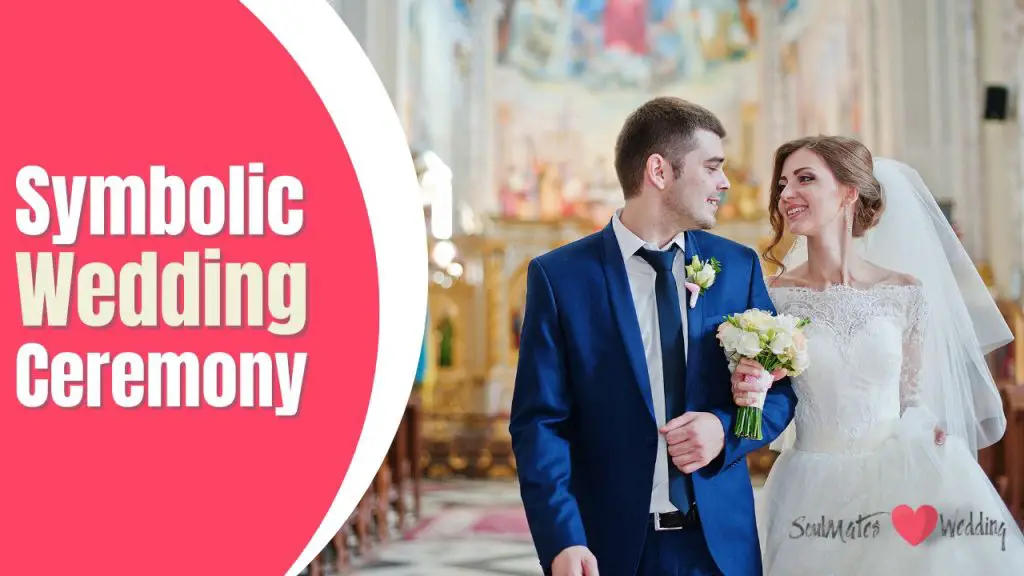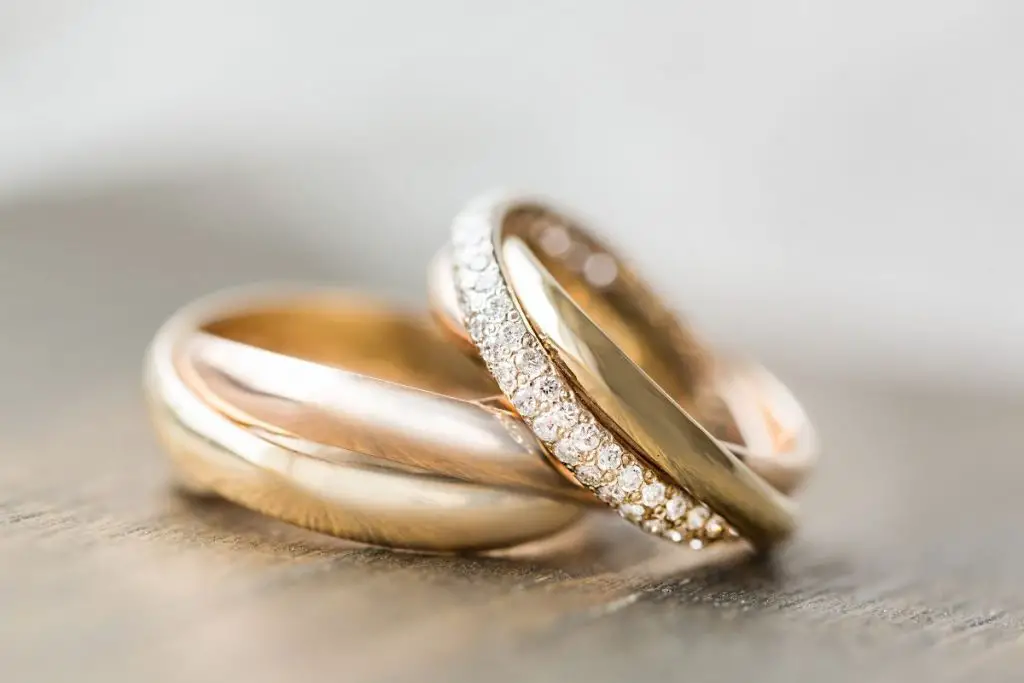A symbolic wedding ceremony is a non-legally binding ceremony that celebrates the union of two individuals in love. Unlike a legal wedding, which has specific legal requirements and involves the signing of legal documents, a symbolic wedding ceremony is not recognized by the law and therefore doesn’t require any legal paperwork.
Instead a symbolic wedding ceremony is a beautiful way for couples to celebrate the beginning of their life together meaningfully and personally. In this article, we will explore what a symbolic wedding ceremony is, its benefits, and how to plan one.
The Benefits of a Symbolic Wedding Ceremony
- The Benefits of a Symbolic Wedding Ceremony
- Types of Symbolic Wedding Ceremonies
- Planning for the Symbolism of the Day
- Choosing the Right Venue and Location
- Selecting Decorations and Details for Your Day
- Creating Your Dream Destination Wedding
- Legal Requirements for Weddings
- Symbols of Love and Commitment on Your Big Day
A Symbolic Wedding Ceremony is a beautiful and meaningful way to express a couple’s love and commitment to each other. Unlike a Civil or Legal Marriage Ceremony, often limited by legal requirements and formalities, a symbolic ceremony allows for more personalization, creativity, meaning, and depth.
One of the most significant advantages of a symbolic wedding ceremony is the ability to tailor the ceremony to the couple’s preferences and personalities. Symbolic ceremonies can incorporate a variety of cultural traditions, unique rituals, and personal touches that illustrate the couple’s love story, individuality, and values. This individualized approach to the ceremony allows for an individual and intimate experience that reflects the love and commitment that the couple shares.
Another benefit of Symbolic Wedding Ceremonies is their ability to perform anywhere. Unlike legal ceremonies, which are often conducted in a registry office or other specific venue, Symbolic Ceremonies can be held outdoors, on the beach, or in a destination that is special to the couple. This provides more flexibility and lets the wedding couple choose their dream destination for their special day.
Symbolic Ceremonies are also an excellent option for couples who prefer a secular ceremony and do not want to include any religious elements as well. Since the ceremony is not legally binding, the couple can design the ceremony that best represents their relationship.
Symbolic Ceremonies can also incorporate unique rituals and traditions, such as a unity candle, a wine ritual, or a Celtic or Irish tradition. These rituals can add meaning and depth to the ceremony and allow family and friends to participate and share in the couple’s special moment.
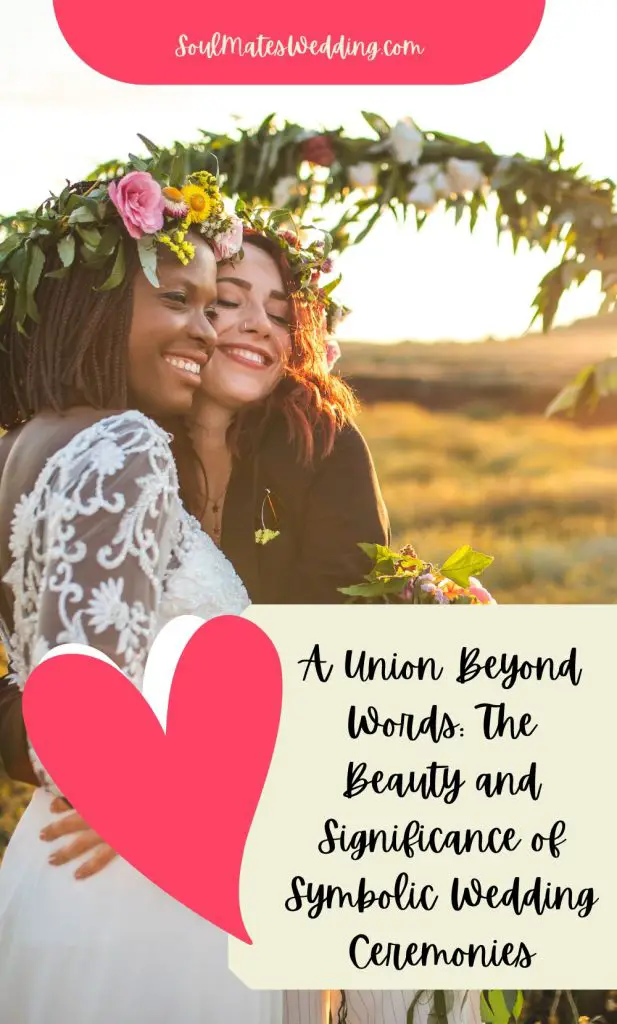
Types of Symbolic Wedding Ceremonies
A wide variety of symbolic wedding ceremonies are available, each with its own cultural traditions and unique touches. Here are a few ideas for a symbolic wedding ceremony:
Religious Ceremony
A religious ceremony can play a significant role in a symbolic wedding ceremony, as it provides couples with a spiritual connection to their union. Religious weddings are often deeply rooted in tradition and held in sacred spaces such as a church or house of worship, adding a sense of holiness and sanctity to the event. Various types of religious ceremonies are available, including Catholic, Protestant, Jewish, and Muslim weddings.
Catholic weddings are typically held in a church and involve a series of rituals and traditions such as the exchange of wedding rings, lighting of unity candles, and readings from scripture. The ceremony is officiated by a priest who also delivers a sermon focusing on marriage’s sanctity.
Protestant weddings can be held in various locations, from churches to outdoor venues. The ceremony incorporates scripture readings, hymns, and prayers that can be personalized to the couple’s preferences. Protestant weddings also involve a sermon that reinforces the importance of the couple’s union in the eyes of God.
Jewish weddings often occur under a chuppah, a canopy that symbolizes the couple’s new home and life together. The ceremony includes seven blessings recited by the rabbi and the exchange of rings. Jewish wedding ceremonies are steeped in tradition and often include cultural elements such as glass breaking to symbolize the Temple’s destruction in Jerusalem.
Muslim weddings involve a marriage ceremony, known as a nikah, which an imam officiates. The ceremony is based on the teachings of the Quran and includes the exchange of vows and rings. The couple is then officially married according to Islamic law.
Several vital elements are typically included regardless of the type of religious ceremony chosen. These include scripture readings, hymns or religious music, prayers, and a message or sermon delivered by the officiant.
An interfaith wedding can be incorporated into a religious ceremony for couples of different faiths. This involves blending traditions from both religions to create a unique and meaningful ceremony that celebrates the couple’s unity while respecting their individual beliefs.
Civil Ceremony
Civil ceremonies are popular for couples who want a legal and formalized union without incorporating any religious elements. These ceremonies are non-religious and are conducted by a government official, such as a judge, justice of the peace, or authorized officiant. Unlike religious ceremonies, no religious scriptures or prayers are recited during a civil ceremony, making it an ideal choice for couples who do not follow a particular religion.
A civil ceremony’s primary purpose is to legally formalize the marriage in the eyes of the law. It offers a secular way for couples to exchange vows and become legally recognized as spouses. Civil ceremonies are preferred by couples who prefer a more straightforward and more intimate wedding without the formality and structure of a religious ceremony. They offer a more laid-back and relaxed approach without sacrificing the day’s significance.
In most countries, couples are required to obtain a marriage license before holding a civil ceremony. This license confirms that the couple has met all legal requirements to marry and is granted by a government body. The marriage license should be obtained to meet all legal requirements before the ceremony.
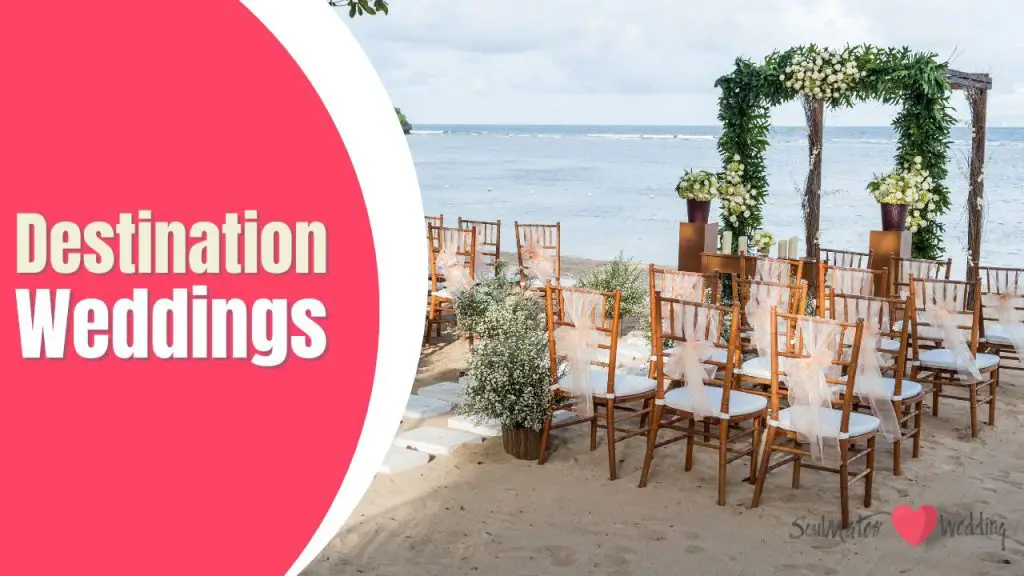
Destination Weddings
Destination weddings are popular for couples who want a unique and memorable way to celebrate their special day. However, planning a destination wedding can be overwhelming and requires careful consideration. Here’s how to prepare for a destination wedding ceremony:
1. Choose the Destination: The first thing to consider is the location of the wedding ceremony. Consider a place that reflects the couple’s personality and interests. Some popular options include a beach wedding, an outdoor wedding, or even a destination wedding at a cultural landmark or a historic city. To choose the appropriate destination and venue for the wedding ceremony, do extensive research and check online reviews to understand what’s available.
2. Plan Guests’ Travel Arrangements: Once a destination is selected, it is critical to assist guests in planning their travel arrangements. Guests will likely travel long distances to attend the wedding ceremony, so picking and coordinating the best travel arrangements tailored to the guest’s preferences and budgets will help them feel welcome and appreciated.
3. Accommodations for the Wedding Party and Guests: To avoid any confusion during the wedding ceremony, it is recommended that the wedding party and guests stay in the exact location. Prioritize accommodations near the venue and amenities such as transportation and food preferences. Blocking a specific number of rooms in a desirable location is recommended for the best experience.
4. Legal Requirements for Marriage: It is critical to check the destination’s legal requirements and research any local laws necessary to obtain a marriage license before the wedding ceremony. This allows couples to complete all legal requirements before the wedding day.
5. Consider Cultural Norms and Expectations: Every culture has its customs and traditions, which should be respected and considered when planning a destination wedding. Make sure to factor in any cultural norms and expectations of the destination, from religious practices to social etiquette.
6. Symbolic Destination Weddings: Choosing the appropriate symbolic wedding type for the chosen location is essential for the overall ambiance. For instance, beach weddings require florists who cater to beach themes, destination weddings at cultural landmarks will require cultural performers, and so on. Choosing the right vendors specializing in the particular type of destination will ensure the wedding ceremony is memorable and unique.
Celtic Traditions in Weddings
Celtic traditions have been an integral part of wedding ceremonies for generations. These traditions have endured the test of time and continue to be beloved by couples worldwide. One of the most famous Celtic traditions commonly incorporated into wedding ceremonies is the use of Claddagh rings.
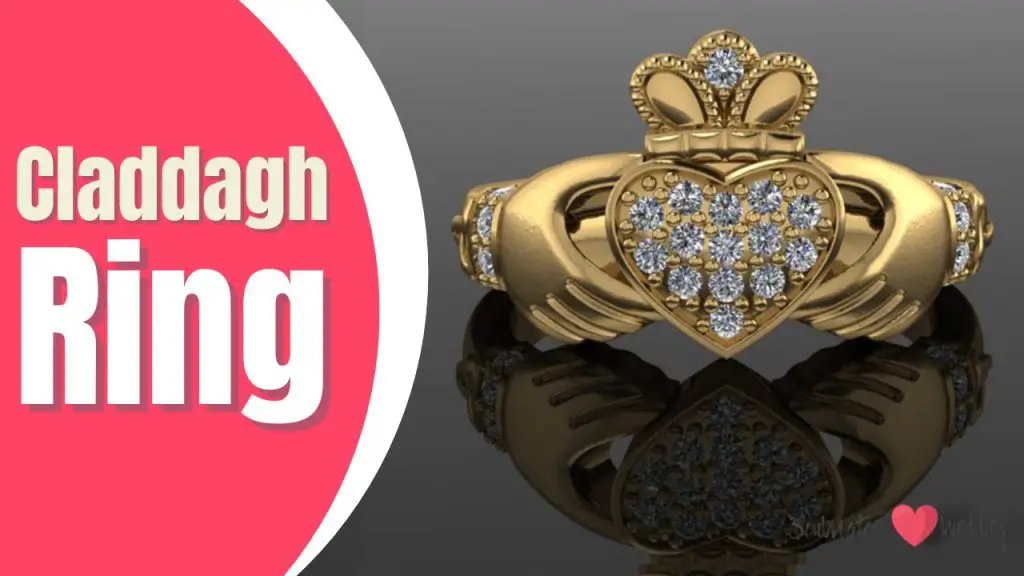
Claddagh rings are an Irish symbol of love, loyalty, and friendship. They were first crafted in the small fishing village of Claddagh near Galway in Ireland during the 17th century. The Claddagh ring comprises two hands holding a heart, topped with a crown.
The hands represent friendship, the heart symbolizes love, and the crown signifies loyalty. Claddagh rings are often passed down as heirlooms from generation to generation, each carrying a unique history. Many couples incorporate Claddagh rings in their wedding ceremony to symbolize love, loyalty, and friendship.
Another Celtic tradition that continues to be popular is the handfasting ceremony. This tradition involves the binding of two lives through the use of cords or ribbons tied around the couple’s hands. The ropes are usually made of natural materials, such as hemp or silk, and come in a variety of colors that have different symbolic meanings.
The handfasting ceremony was a common practice in Scotland during the Middle Ages and was used as an alternative to the formal wedding ceremony. This ceremony is not legally recognized but symbolizes the union of two people. Couples are choosing to incorporate the traditional handfasting ceremony into their wedding celebrations to pay tribute to their Celtic heritage.
By incorporating Celtic traditions such as Claddagh rings and the handfasting ceremony, couples can add a unique touch to their wedding ceremony while paying homage to their heritage. These traditions remind us of the time-honored beauty of our shared history and can make a wedding ceremony even more meaningful and memorable.
Planning for the Symbolism of the Day
When it comes to planning a wedding, there are a lot of decisions to make. The details can seem endless, from choosing a venue to picking out the perfect wedding dress. A critical aspect of the wedding day is the symbolism that will be incorporated into the ceremony and celebration. Whether you want to include religious or cultural traditions or create your unique symbolism, planning for the meaningful aspects of the day can add depth and significance to your wedding.
Choosing the Right Venue and Location
The venue affects the ambiance, accessibility, and overall experience of the ceremony, so it’s essential to consider the couple’s cultural and aesthetic preferences while also keeping practical factors in mind.
One factor to consider is the number of guests that will be attending the ceremony. The venue should comfortably accommodate the number of guests, with enough space to move around and mingle. It’s also essential to think about accessibility, making sure the location is easy to reach for guests of all ages and abilities.
Another crucial factor is the weather. Depending on the season and the couple’s desired ambiance, an outdoor vs. indoor ceremony should be considered. Outdoor ceremonies can be incredibly stunning but can also be challenging in inclement weather. And while indoor ceremonies provide a certain level of relief from the elements, the overall ambiance can be compromised if they’re not well-ventilated.
When exploring venue options, a garden or beach ceremony can provide a beautiful and serene backdrop for the symbolic exchange of vows. However, these locations require additional planning to ensure enough space for guests to be seated and adequate restrooms and parking facilities.
A historical building or traditional hall could be a great option for couples who prefer a more traditional setting. These venues often include stunning architectural details and ample guest space, with built-in amenities such as lighting and restrooms.
Ultimately, the chosen venue should match the couple’s cultural and aesthetic preferences and provide the essential amenities needed for a successful ceremony. A stunning view or unique architectural detail could also enhance the overall experience of the ceremony, creating a lasting memory for both the couple and their guests.
Selecting Decorations and Details for Your Day
Your symbolic wedding ceremony is a reflection of you as a couple, which is why choosing the right decorations and details is an essential aspect of planning your special day. Whether aiming for a bohemian vibe or a more traditional look, the key is incorporating elements that represent your unique love and commitment.
Start by deciding on an overall aesthetic that reflects your and your partner’s preferences. If you’re drawn to a bohemian or rustic theme, consider incorporating natural elements like greenery, wood accents, or soft lighting to create a cozy, romantic ambiance. Alternatively, ornate floral arrangements, classic lighting options, and elegant decor elements can enhance a traditional theme.
Regardless of your theme, it’s essential to consider meaningful details representing your love and commitment, such as incorporating a unity candle or a wine ritual. These elements can add a personal touch to your ceremony and create a lasting memory for you and your guests. Consider introducing cultural traditions or family heirlooms that can add a special touch to the day.
When it comes to décor elements, there are many options, including floral arrangements, lighting, candles, textiles, and more. Consider working with a wedding planner or decorator to help choose the right pieces to create the desired atmosphere.
Remember, creating a ceremony that reflects your unique style and relationship is key. By selecting the right decorations and details, you can create a beautiful and meaningful day that you and your guests will cherish forever.
Creating Your Dream Destination Wedding
For many couples, getting married in an exotic locale is the ultimate dream. Picture exchanging vows on a picturesque Caribbean beach amidst the stunning Tuscan countryside or the beautiful island of Bali. The allure of a dream destination wedding is undeniable, as it can provide an unparalleled and unforgettable experience for couples and their guests.
One of the primary reasons for destination weddings’ growing popularity is the event’s intimate nature. A smaller guest list allows couples to spend more time with their loved ones during the extended celebration. It also provides a more relaxed atmosphere, allowing the couple and guests to enjoy the destination and create lasting memories.
Another significant benefit of a destination wedding is the opportunity to have a unique experience. For instance, couples can opt for a beach, vineyard, or castle wedding that reflects their unique vision instead of the typical church or reception hall. Moreover, an exotic locale can provide a stunning backdrop and set the tone for an unforgettable celebration.
With numerous options, selecting the ideal location for a dream destination wedding can be challenging. Some popular wedding destinations include Hawaii, the Caribbean Islands, Tuscany, Bali, and Santorini. These locations offer scenic beauty, cultural richness, and unique experiences that add to the overall ambiance of the event.
Ultimately, creating a dream destination wedding comes down to the couple’s vision and preferences. With careful planning and consideration, couples can craft a wedding experience that represents their love and commitment while enjoying an incredible and memorable adventure with their loved ones.
Legal Requirements for Weddings
When planning a wedding, ensuring your marriage is legally recognized is crucial. Depending on the type of ceremony you’re planning – whether religious or civil – there are specific legal requirements you’ll need to fulfill. Here’s a guide to obtaining marriage licenses and certificates for both types of ceremonies.
Obtaining Marriage Licenses & Marriage Certificates
In most countries, a marriage license is required to recognize a civil ceremony legally. You’ll typically need to visit your local registry office or equivalent authority to obtain a marriage license. This differs slightly from country to country, but generally, you’ll be required to provide identification documents, such as a passport or birth certificate and proof of residence.
Some countries may require you to prove that you’re not currently married in the form of a certificate of no impediment. Additionally, some authorities may require certification for pre-marriage counseling.
It’s also worth noting that some countries may impose a waiting period after you’ve applied for a marriage license. This is usually a few days, but it is best to check with the relevant authority to determine exactly how long this might be. Once the waiting period ends, you’ll be issued a marriage license as proof of your marriage eligibility.
Religious Ceremony: Obtaining a Marriage Certificate
If you plan on having a religious ceremony, the process of obtaining a marriage certificate may differ slightly. Depending on the specific requirements of your religious institution, you may be asked to provide additional documentation beyond what’s required for a civil ceremony. For example, some religious institutions may request proof of baptism or even a letter of recommendation from your priest or rabbi.
In most countries, you’ll need to obtain a marriage certificate from the local authority after the religious ceremony. This document serves as legal recognition of your marriage, and it’s usually issued either by the registry office or the religious institution itself. Similar to obtaining a marriage license, you must provide identification documents and possibly other certifications. Once obtained, the marriage certificate signifies that your marriage is legally recognized, regardless of your chosen type of ceremony.
Symbols of Love and Commitment on Your Big Day
A wedding ceremony is not only a celebration of love but also a commitment to a lifetime together. Various symbols are commonly used in wedding ceremonies to represent love and commitment. These symbols add a touch of personalization and make the ceremony an unforgettable event.
Wedding Rings: The wedding ring is the most common symbol of love and commitment in a wedding ceremony. It represents the infinite love and unbreakable bond between the couple and is usually worn on the fourth finger of the left hand. Wedding rings can be customized to include inscriptions, etchings, or unique designs that represent the couple’s love story.
Unity Candle: The Unity Candle is another popular symbol of love and commitment. Two candles are lit during the ceremony, representing the couple’s individual lives. The couple then uses their unique candles to light a more significant central candle, symbolizing their union.
Bottle of Wine: A bottle of wine symbolizes love and commitment, representing the couple’s willingness to share and support each other, even in moments of sorrow. The couple can use a bottle of wine during their ceremony by either sharing a sip or pouring the wine into a shared glass, signifying their union and commitment to each other.
Cultural and Religious Traditions: Many cultures and religions have unique traditions that symbolize love and commitment. For example, the Celtic handfasting tradition involves the couple’s hands being bound together with ribbons or cords, representing a union of their lives. The Spanish culture has a ritual known as the arras ceremony, which involves the groom giving 13 gold coins to the bride as a symbol of his commitment to providing for their future.
Personalization of Symbols: Your wedding day should reflect your unique love story. Couples can personalize symbols by adding individual touches, such as customized inscriptions, or choosing a unique design for the wedding rings. Cultural or religious traditions can also be incorporated to give a personal touch to the ceremony.
Incorporating Symbols: Symbols can be incorporated into a ceremony in various ways. It can include including readings, music selection, or a wine ritual. Couples can also choose to have a special ceremony to symbolize their union, such as planting a tree together or having a sand ceremony.
In conclusion, choosing the correct symbols for your wedding ceremony can make it a memorable and meaningful event. Whether using traditional symbols or personalizing them to fit your love story, they represent your love and commitment to each other
If you have a tradition or symbolic gesture that you would like to share be sure to comment below.

Cynthia Pate is a passionate writer and wedding enthusiast, dedicated to helping couples create their dream celebrations. With years of experience in the wedding industry, Cynthia has developed a deep understanding of the latest trends, timeless traditions, and unique ideas that make every wedding special. Her articles cover a wide range of topics, from planning and decor to etiquette and fashion, always with the goal of providing practical advice and inspiring ideas. When she’s not writing about all things wedding-related, Cynthia enjoys exploring new destinations, trying out local cuisines, and spending time with her family and friends.

